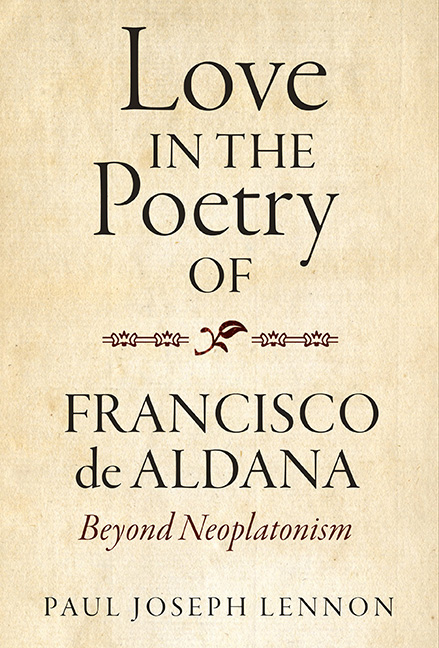3 - The Nature of Love
Published online by Cambridge University Press: 15 October 2019
Summary
Previously, we saw how Aldana's lyric voice put forward a hypothetical scenario that outlined the unrivalled power of reciprocal love, and it was clear from the praise for the female beloved that the rhetorical force was meant to engender a shared love with the dama in question. This chapter marks a transition to the pastoral genre and considers the opportunities it affords both poet and reader to examine a less idealised approach to love than that at play in contemporary treatises, such as those examined in Chapter 1. Aldana's pastoral, I contend, does not replicate the idealised loves and landscapes of yore; rather, it takes advantage of the genre's blurred boundaries in the Renaissance to present an alternative to the songs of unrequited love that typified contemporary Spanish amatory lyric.
It is apparent from the wealth and breadth of scholarship on the pastoral that many have attempted to provide a comprehensive and overarching definition of the genre, but this has proven counterproductive given its myriad definitions, dependent as much on critic as poet. For this reason, my intention is to highlight those facets of the genre applicable to the Renaissance pastoral, and, more specifically, Aldana's poetry, before I reflect on how they contribute to his representation of love. Primarily, this will involve an investigation of Aldana's attempts to effect a reconciliation between physicality and spirituality in love-related issues beyond the remit of the idealised pastoral genre. These are realised in poems that were most likely written for literary salons, but that ultimately found a wider audience thanks to their publication by Cosme de Aldana. Four poems from Aldana's pastoral corpus, selected for their unique and revelatory perspectives on love, will be examined in two pairings. The first pair consists of ‘Cuál es la causa, mi Damón’ and ‘Mil veces digo, entre los brazos puesto’, while the second sees ‘De sus hermosos ojos, dulcemente’ and ‘Solías tú, Galatea, tanto quererme’ brought together for analysis. In light of the first pair of poems, whose perceived interrelationship has been a subject of debate between Ferraté and Walters, I intend to demonstrate Aldana's use of the pastoral genre to illustrate his thoughts on the nature of love.
- Type
- Chapter
- Information
- Love in the Poetry of Francisco de AldanaBeyond Neoplatonism, pp. 89 - 124Publisher: Boydell & BrewerPrint publication year: 2019



